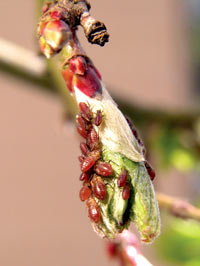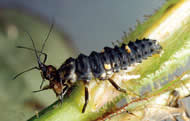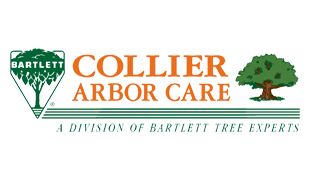|

Aphids suck plant fluids from leaves, buds, stems, and bark. AphidsDownload a PDF of this articleDescriptionAphids are small soft-bodied insects. They may be yellow, green, pink, red, purple, brown or black in color. There is also considerable variation in size between species. Some infest only one plant species, while others feed on a wide variety of hosts. Plants AffectedMost trees and shrubs are affected by at least one species of aphid. Some of the more commonly affected plants include: birch, oak, beech, maple, elm, linden, tulip tree, spruce, apple, daphne and roses. Symptoms/DamageAphids suck plant fluids from leaves, buds, stems and bark. Their feeding may cause discoloration, distortion, stunting, individual leaf death and occasionally severe defoliation. As the insect grows it periodically sheds its skin, leaving behind a white casing in the shape of its body that often sticks to plant surfaces. They excrete a sticky substance called honeydew that covers foliage, cars, furniture, etc. Black sooty mold often grows on foliage that is covered with honeydew. It can be unsightly and sometimes injurious. Life CycleThe aphid family has one of the highest reproductive potential of all insects. They can complete their life cycle in 10 days by giving birth to live young. The winged adult aphid can fly to new host trees. Aphids overwinter as eggs on plants. In the spring, they emerge and begin to give live birth. Throughout the growing season, only females are produced. It is not until autumn that males are produced. At this time, they mate with females who then lay eggs to overwinter on the plants. ManagementCulturalWash aphids off of plant with a strong jet of water to help decrease the population. BiologicalNatural presence and release of predatory and parasitic insects such as: Lady beetle larvae and adults, larvae of lacewings, syrphid flies, and parasitic wasps. OrganicHorticultural oils or soaps will reduce populations, but will need repeated applications. ChemicalFoliar applied approved insecticides with residual activity can provide good control. Soil applied systemic insecticides provide good control with little harm to beneficial insects (pollinators, parasites and predators) and often eliminates the need for multiple foliar applications. |

Biological control by lady beetle larvae which feeds on aphids. |
|
Home |
Services |
The Arbor Advisor |
Garden Calendar |
About Us |
Fact Sheets |
Contact Us |
Site Map Collier Arbor Care Portland 503-722-7267 Vancouver (360) 693-6056 Site contents and design ©2013 Collier Arbor Care |





